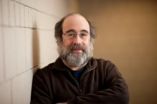Researchers observe disruptions of daily rhythms in Alzheimer's patients' brains
Clocks in the human brain
2011-04-28
(Press-News.org) Twenty-four hour cycles, known as circadian rhythms, are important for proper body functions, including for normal brain function and mental health. Disruptions of circadian rhythms and sleep-wake cycles have been observed in patients with Alzheimer's disease. A new study by Douglas Institute researchers unravels a possible basis for these perturbations.
First study to show function of clock genes in multiple areas of the human brain
Until now, the genes contributing to this timing, known as clock genes, have only been found to be active in areas outside the brain, such as the skin and blood cells. Recent findings from the Douglas Mental Health University Institute are the first to show that these genes function in multiple areas of the human brain as well, as was shown previously in animals. These findings, published in this month's issue of the Journal of Biological Rhythms, have implications for the numerous individuals with sleep disturbances including those with Alzheimer's disease.
"To our knowledge, this is the first demonstration of circadian clock genes rhythmic expression in the human forebrain, or the front part of the brain," says senior author Nicolas Cermakian, a Douglas researcher and Director of the Laboratory of Molecular Chronobiology. "In addition, we showed that these rhythms are disrupted in the brains of Alzheimer's patients."
Shape of certain rhythms and the synchronization between brain areas
were altered in Alzheimer's patients
Dr. Cermakian and his colleagues looked for the presence of the circadian clock genes, PER1, PER2, and BMAL1 in the brain tissue of 58 donors; 27 were Alzheimer patients and 31 were controls. (Brain tissue was obtained from the Brain Bank of the Douglas.) All these clock genes were detected in three brain areas in both control and Alzheimer patients. In addition, there was a significant diurnal (day/night) expression of these genes in all three structures of control samples. In samples from Alzheimer's patients, the shape of these rhythms and the synchronization between brain areas were altered.
"The abnormal clock gene coordination that we observed in the tissues of Alzheimer's patients, might explain the sleep-wake deficits that are observed in this population," says Douglas Centre for Study and Treatment of Circadian Rhythms Director, Diane B. Boivin. "The altered sleep pattern worsens with disease progression and is the most frequent reason for institutionalization. Improved understanding of the process that underlies sleep-wake disruption may lead to better treatments or therapies. "Our ultimate goal is to improve the physical and mental health of individuals by providing scientifically grounded information."
INFORMATION:
About the study
The article, "Circadian clock gene expression in brain regions of Alzheimer's disease patients and control subjects", was authored by Nicolas Cermakian, Elaine Waddington-Lamont, Philippe Boudreau and Diane B. Boivin of the Douglas Mental Health University Institute and McGill University.
END
ELSE PRESS RELEASES FROM THIS DATE:
2011-04-28
ANN ARBOR, Mich. — Researchers at the University of Michigan Comprehensive Cancer Center have identified a protein that shows distinct changes in structure between pancreatic cancer, non-cancerous diseases and normal blood serum. The protein also changes from early stage pancreatic cancer to advanced disease.
The finding suggests a blood test could serve as a potential screening tool to detect pancreatic cancer – which has the worst prognosis of any cancer type – at an earlier, more treatable stage.
"One of the difficulties in screening for pancreatic cancer is distinguishing ...
2011-04-28
British Airways has increased capacity on its popular London City to Palma service by 50 per cent to meet the demand for seats this summer.
With additional frequency and larger aircraft the airline will be providing over 25,000 seats to the Spanish holiday island direct from the Docklands making holidays to Palma de Mallorca more accessible than ever before.
Due to the high early season demand, the three-times-a-week flights will increase to six-days-a-week, excluding Saturdays, in July and August. The Friday and Sunday flights to Palma de Mallorca and Ibiza, on ...
2011-04-28
University of Alberta-led research has confirmed that a relatively harmless inorganic form of mercury found worldwide in ocean water is transformed into a potent neurotoxin in the seawater itself.
After two years of testing water samples across the Arctic Ocean, the researchers found that relatively harmless inorganic mercury, released from human activities like industry and coal burning, undergoes a process called methylation and becomes deadly monomethylmercury.
Unlike inorganic mercury, monomethylmercury is bio-accumulative, meaning its toxic effects are amplified ...
2011-04-28
Guoman Hotels Grand Imperial London has launched its unique take on a timeless classic by offering its customers Oriental Afternoon Tea.
Recalling the glamour of the orient with a sleek modern twist, guests can unwind safe in the knowledge that even their 'chi' will get some much needed rejuvenation in an ambience designed with a Feng Shui master.
The Asian-inspired tea arrives presented on a stand laden with Cantonese sweets, treats and savouries. The first course includes fresh black cod rolls, wrapped in Kataifi pastry and Char Sui Bao. Both made with the freshest ...
2011-04-28
Edmonton – Researchers in the Faculty of Medicine & Dentistry at the University of Alberta have made an important discovery that provides a new understanding of how our immune system "learns" not to attack our own body, and this could affect the way doctors treat patients with autoimmune diseases and cancer.
When patients undergo chemotherapy for cancer or as part of experimental therapies to treat autoimmune diseases such as diabetes and lupus, the treatment kills the patients' white blood cells. What can be done afterwards, is to give these patients blood stem cells ...
2011-04-28
Berkeley, CA-- As China's economy continues to soar, its energy use and greenhouse gas emissions will keep on soaring as well—or so goes the conventional wisdom. A new analysis by researchers at Lawrence Berkeley National Laboratory (Berkeley Lab) now is challenging that notion, one widely held in both the United States and China.
Well before mid-century, according to a new study by Berkeley Lab's China Energy Group, that nation's energy use will level off, even as its population edges past 1.4 billion. "I think this is very good news,'' says Mark Levine, co-author of ...
2011-04-28
Researchers have begun screening the first definitive collection of thousands of approved drugs for clinical use against rare and neglected diseases. They are hunting for additional uses of the drugs hoping to find off-label therapies, for some of the 6,000 rare diseases that afflict 25 million Americans. The effort is coordinated by the National Institutes of Health's Chemical Genomics Center (NCGC).
"This is a critical step to explore the full potential of these drugs for new applications," said NIH Director Francis S. Collins, M.D., Ph.D. "The hope is that this process ...
2011-04-28
Fasthosts Internet Ltd, a leading web hosting provider, has announced a brand new mobile website builder for its hosting customers. The service enables any level of user to build a mobile compatible website in minutes.
The mobile website builder application can detect mobile visitors and provides them the choice of whether to view a mobile-friendly website or full website version. By catering for mobile users, a business can tap into additional online revenues and ensure greater customer retention and recommendation.
More Britons are browsing the web on the ...
2011-04-28
A new study in rats is shedding light on how sleep-deprived lifestyles might impair functioning without people realizing it. The more rats are sleep-deprived, the more some of their neurons take catnaps – with consequent declines in task performance. Even though the animals are awake and active, brainwave measures reveal that scattered groups of neurons in the thinking part of their brain, or cortex, are briefly falling asleep, scientists funded by the National Institutes of Health have discovered.
"Such tired neurons in an awake brain may be responsible for the attention ...
2011-04-28
Saxo Bank, the specialist in online trading and investment, has launched four futures that will, for the first time, offer investors who are not residents in Brazil direct access to the Brazilian market. The products include the Bovespa Index and USD/BRL cross and enable investors to gain exposure to one of the currently most buoyant economies and hedge risks in their portfolios.
With this launch, Saxo Bank provides investors with four futures investment instruments - the BOVESPA Index, IBOVSPA Index Mini, BMF US Dollar Future and Mini BMF US Dollar - that are available ...
LAST 30 PRESS RELEASES:
[Press-News.org] Researchers observe disruptions of daily rhythms in Alzheimer's patients' brains
Clocks in the human brain

